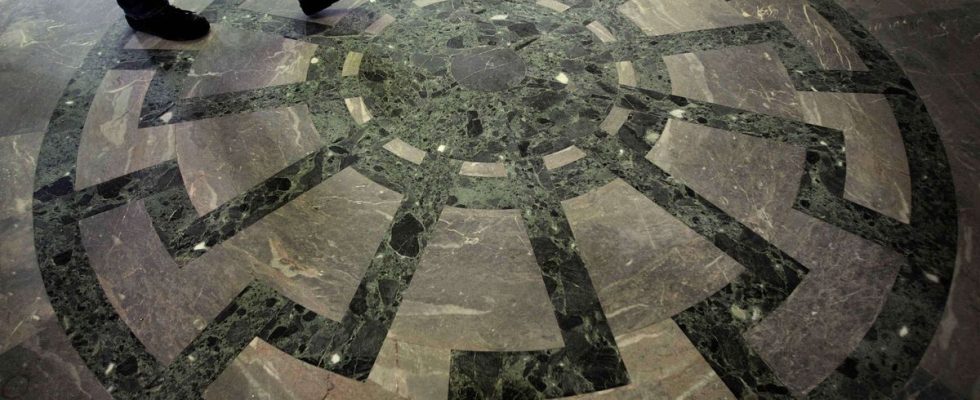At the Assize Court specially composed of minors in Paris,
Alexandre Gilet recognizes it bluntly, he has, in this affair, a “share of responsibility”. “At a time in my life when I was radicalized following the attacks of 2015, I considered plans for violence”, explains, hands joined in the dock, the 27-year-old young man, black t-shirt tight, shaved hair on one side, thick lock on the other. However, he immediately specifies, there is a gap between theory and practice. “I did not feel psychologically able to take action,” he insists. Since Monday and for two weeks, four activists close to the neo-Nazi movement have been tried before the Assize Court specially composed of minors, suspected of having prepared attacks between 2017 and 2018.
Alexandre Gilet is the only one to appear detained. He is the one on whom all eyes turn on this first day of hearing. This former volunteer policeman is presented in the investigation file as the central piece, “the most radical and the most motivated”, write the examining magistrates. They believe that it is under his “impulse” that the group drifts towards “the development of terrorist projects”. If he denies any desire to take action, he admits having had “at the time, a really radical position”. During the investigations, the investigators notably discovered writings reminiscent of those of “mass killers”, in particular Anders Breivik, the Norwegian neo-Nazi, for whom he admitted having been an admirer. “I regret having gone so far, to have caused harm to my family, to the institution that is the gendarmerie, to my co-indicted”, he insists.
“For me, Alexandre is not a leader”
At the helm his parents, she, a cleaner, he, a cook, tell of their amazement to see their only son involved in such a case. Unimaginable, even for his father, who specifies that his grandfather – the great-grandfather of the accused, therefore – was killed by the Nazis during the Second World War. “For me, Alexandre is not a leader, he specifies, they got into trouble with his friends. »
Although separated for twenty years, his parents hold a similar discourse, describe a calm child, who begins to isolate himself in college, spending more and more time on his computer. “Since college, I was in a solitary lifestyle, especially on the Internet. But this is not a difficulty, it is that it did not interest me, ”explains the person concerned. “It’s still quite rare for an assize trial where there is not at least one childhood friend or girlfriend who comes to testify…”, cannot help but notice one of the assessors. He had no serious relationship, refusing to engage with a person who did not share his beliefs.
The November 13 attacks, a turning point
If his relatives have not measured the extent of his radicalization, they agree that the attacks of November 13 mark a turning point. “Since the attacks, he had an extreme right speech, he did not like foreigners”, notes his father who affirms not to share his ideas. He also sees with a very bad eye that his son begins to acquire – certainly legally – weapons (two Kalashnikovs, a shotgun and an automatic pistol) that he stores at home. Alexandre Gilet is then a voluntary deputy gendarme. He joined this corps in the summer of 2016 after a first failed experience in the army. Although he holds a CAP in Sales, he decided to enlist at just 18 years old, in mid-2015, to “defend [son] country “. But the hierarchy weighs on him and six months later, he resigns.
The pattern will be repeated in the gendarmerie. If his first evaluations are very positive, his contract will not be renewed in 2018 after he challenged an order. A few weeks after learning this news, he was indicted: a company made a report after an order for products used in the composition of TATP, a powerful explosive. “I did not think it would take such a proportion, that it would go so far,” he admits today.
Today, he affirms that his follow-up for terrorist radicalization “allowed him to understand that it was not worth it”, affirms that he no longer has a “really radical” position as at the time. “I’m sorry,” he insists. However, his career in detention shows fairly close relations with members of the ultra-right. Simply because they were detained in the same neighborhood, he explains. As for his occupations in prison, in addition to the sport which occupies most of his days, there are his readings of historical works. With a weakness for ancient Egypt and the Mayas but also the period of the Crusades and that of the Second World War.
The defendants risk thirty years of imprisonment for adults, 15 years for minors.

